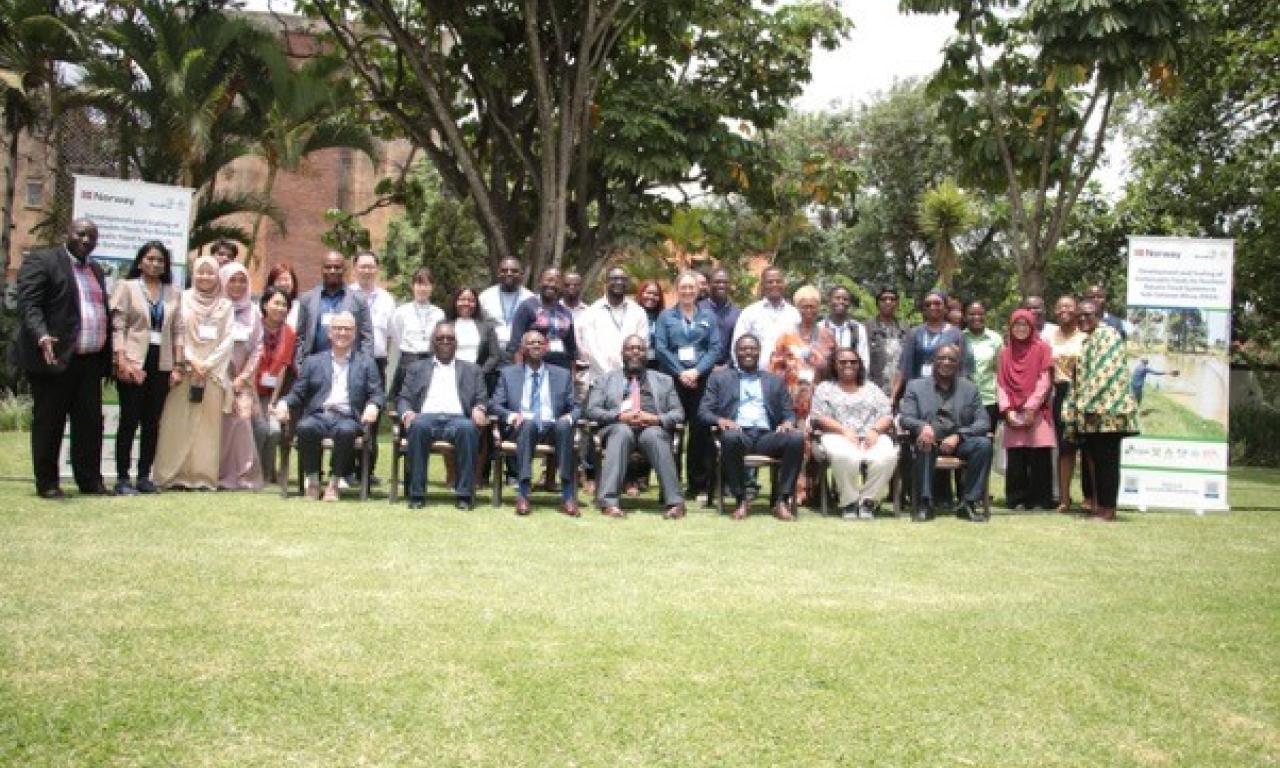
Aquaculture in low-income countries faces a major challenge: the high cost of aquatic feeds, which makes up nearly 70% of production expenses. As the industry grows, affordable and high-quality feeds are critical for smallholder fish farmers to boost productivity. However, commercial feeds are often too expensive, environmentally unsustainable, and inaccessible for many smallholders.
Tackling the Feed Challenge in Aquaculture
To address this, the WorldFish-led FASA (Development and Scaling of Sustainable Feeds for Resilient Aquatic Food Systems in Sub-Saharan Africa) project, funded by the Norwegian Agency for Development Cooperation (NORAD), aims to revolutionize aquaculture in Africa by developing affordable, nutrient-rich and sustainable fish feeds using locally sourced ingredients in three implementing countries—Nigeria, Kenya and Zambia. By leveraging novel ingredients and innovative technologies, the project seeks to empower smallholder fish farmers in Nigeria, Kenya, and Zambia, leading to increased food security, reduced environmental impact, and improved livelihoods.
Progress and Achievements at the Lusaka Workshop
The FASA project completed its third annual workshop, November 11-15, 2024, in Lusaka, Zambia, convening implementing partners from the three countries to review the achievements in the project’s second year and further explore pathways to sustainable feed improvements for smallholder fish farmers in Africa.
The participants included implementing partners, West and Central African Council for Agricultural Research and Development (CORAF) in Nigeria and the International Centre of Insect Physiology and Ecology (ICIPE) in Kenya, along with the Zambian Ministry of Fisheries and Livestock and the Natural Resources Development College, the Swedish University of Agricultural Sciences (SLU), the International Institute of Tropical Agriculture (IITA), and private sector enterprises as part of FASA stakeholders.
The Zambian government demonstrated its support for the FASA implementation in Zambia as the Guest of Honor, Zambia’s Minister of Fisheries and Livestock, Engineer Peter Kapala, declared the workshop open. He was represented by the Director of Fishery, Evans Mutanuka.
Reiterating the impact of Zambian government’s support for the aquaculture sector, Mutanuka quoted the minister as saying,
“The total number of smallholder aquaculture farmers in Zambia is estimated to have increased from 8,000 in 2010 to 16,000 in 2023, of which 50% are women and youths.”
WorldFish Country Director for Zambia and Southern Africa, Dr. Victor Siamudaala, opened the discussions by highlighting the persistent challenge of affordable feed in Zambia, a critical barrier to aquaculture growth in the region. He stated:
“Affordable quality feed has been a long-term challenge in the aquaculture industry in Zambia, and the challenge also cuts across animal production systems. We appreciate the support provided by the Zambian government and WorldFish, because the support is an acknowledgement of the problem and a step to stimulate growth of aquaculture in Zambia.”
![FASA workshop participants visited the recirculation aquaculture system fish wet laboratory[6]](/sites/default/files/inline-images/FASA%20workshop%20participants%20visited%20the%20recirculation%20aquaculture%20system%20fish%20wet%20laboratory%5B6%5D.jpg)
Dr. Rodrigue Yossa, Director of Aquatic Food Biosciences at WorldFish, emphasized the urgent need to scale feed production to support Africa’s aquaculture ambitions. He reminded the workshop participants that the overall goal of the FASA project extends beyond the three focal countries, saying,
“The results coming from this project will be leveraged to achieve the goal of nourishing people through aquatic food globally. It means that what we are doing will be a game-changer for large-scale aquaculture in the Global South—Africa, Asia, the Pacific and South America.”
Dr. Essam Yassin Mohammed, Director General of WorldFish, highlighted the broader goal of the FASA project: to empower smallholder farmers with affordable feed options that boost income, strengthen food security, and reduce environmental impact. He noted that, while challenges exist, the collaboration among stakeholders is paving the way for transformative impact in aquaculture across Africa and beyond.
“Together, we are working with farmers to improve income, boost food security and reduce waste and pollution; all contributing to a healthier planet and shared prosperity for all.” - Dr. Essam Yassin Mohammed
The workshop highlighted the completion of comprehensive scoping studies that provide vital insights into the availability, pricing, and seasonality of local ingredients used in fish feeds, setting a robust foundation for sustainable and viable feed alternatives in the three focal countries – Zambia, Kenya, and Nigeria.
There were notable discussions on the progress of the nutritional experiments and digestibility trials, key scientific information to be generated by the project; market assessments and scaling plans to ensure adoption of feed solutions; completion of the annual climate and environment assessments; and implementation of the comprehensive lifecycle assessment in Nigeria, Kenya and Zambia.
Workshop discussions emphasized practical solutions, such as improving ingredient drying processes, integrating climate resilience into feed strategies, and scaling up efforts to reach more smallholder farmers, while partners provided updates on research activities and outcomes, outlined work plans, and shared a collective vision for 2025 and beyond.
